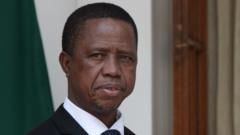South Africa's coalition government, formed amid significant political shifts, encounters potential disintegration after a pivotal budget vote exposes stark disagreements between its primary parties, the African National Congress (ANC) and the Democratic Alliance (DA).
Is the Coalition Government in South Africa Teetering on the Brink?

Is the Coalition Government in South Africa Teetering on the Brink?
The fragile coalition between South Africa’s ANC and DA faces turbulence as tensions intensify over budget disputes.
The recent discord emanates from the DA's rejection of a key budget provision connected to a VAT increase, which the ANC deems essential for maintaining public services. The breakdown of collaboration indicates the possibility of a rupture in the government of national unity (GNU), leaving many to ponder its future stability.
As political tensions escalate, the DA’s choice to stand against the ANC’s budget proposals – which include the contentious VAT hike – has raised questions about the coalition's longevity. The DA, traditionally positioned as a center-right party, argues that the increase would disproportionately burden poorer citizens, while the ANC maintains that it is vital for fiscal sustainability.
In a decisive parliamentary vote, the ANC secured the fiscal framework’s passage, garnering support from smaller parties to tip the balance to 194 votes against 182. However, the DA has raised concerns about the legitimacy of the process, activating legal channels to contest the outcome, which may lead to further instability in the coalition framework.
Political analyst Professor William Gumede highlights the precariousness of the DA's stance, noting that their follow-up decisions will significantly impact the coalition's fate. While DA leadership deliberates its next steps, they have expressed dissatisfaction with the ANC's perceived refusal to compromise.
The friction between the ANC and DA is reflected in public remarks, with both sides trading accusations of betrayal and inflexibility. The DA's alignment with populist opposition parties during this budget vote serves as a surprising yet strategic move against the ANC, intensifying the crisis within the GNU.
As the economic landscape worsens, illustrated by burgeoning unemployment rates and international economic pressures, critics urge both parties to reconcile their differences for the nation's stability.
With the coalition government at a crucial juncture, South Africa’s political future hangs in the balance, amid calls for unity in the face of escalating economic challenges.
As political tensions escalate, the DA’s choice to stand against the ANC’s budget proposals – which include the contentious VAT hike – has raised questions about the coalition's longevity. The DA, traditionally positioned as a center-right party, argues that the increase would disproportionately burden poorer citizens, while the ANC maintains that it is vital for fiscal sustainability.
In a decisive parliamentary vote, the ANC secured the fiscal framework’s passage, garnering support from smaller parties to tip the balance to 194 votes against 182. However, the DA has raised concerns about the legitimacy of the process, activating legal channels to contest the outcome, which may lead to further instability in the coalition framework.
Political analyst Professor William Gumede highlights the precariousness of the DA's stance, noting that their follow-up decisions will significantly impact the coalition's fate. While DA leadership deliberates its next steps, they have expressed dissatisfaction with the ANC's perceived refusal to compromise.
The friction between the ANC and DA is reflected in public remarks, with both sides trading accusations of betrayal and inflexibility. The DA's alignment with populist opposition parties during this budget vote serves as a surprising yet strategic move against the ANC, intensifying the crisis within the GNU.
As the economic landscape worsens, illustrated by burgeoning unemployment rates and international economic pressures, critics urge both parties to reconcile their differences for the nation's stability.
With the coalition government at a crucial juncture, South Africa’s political future hangs in the balance, amid calls for unity in the face of escalating economic challenges.






















